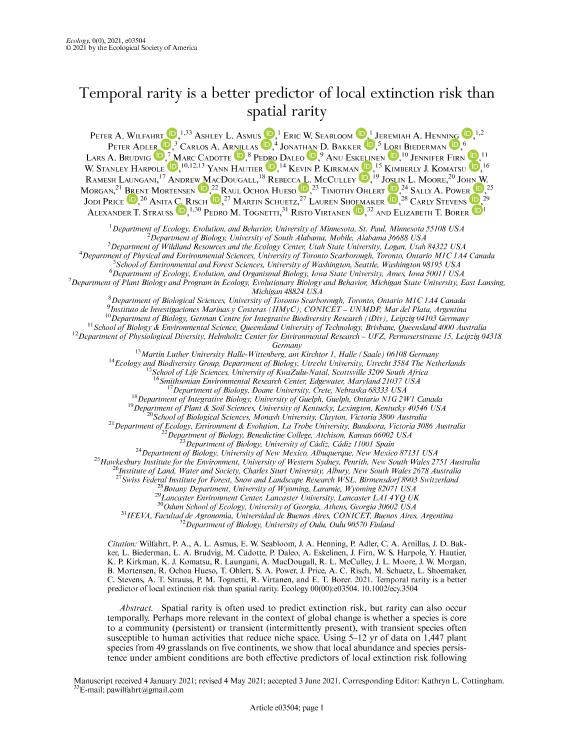Mostrar el registro sencillo del ítem
dc.contributor.author
Wilfahrt, Peter A.
dc.contributor.author
Asmus, Ashley L.
dc.contributor.author
Seabloom, Eric

dc.contributor.author
Henning, Jeremiah A.
dc.contributor.author
Adler, Peter

dc.contributor.author
Arnillas, Carlos A.
dc.contributor.author
Bakker, Jonathan

dc.contributor.author
Biederman, Lori
dc.contributor.author
Brudvig, Lars A.
dc.contributor.author
Cadotte, Marc W.

dc.contributor.author
Daleo, Pedro

dc.contributor.author
Eskelinen, Anu

dc.contributor.author
Firn, Jennifer

dc.contributor.author
Harpole, W. Stanley
dc.contributor.author
Hautier, Yann

dc.contributor.author
Kirkman, Kevin P.
dc.contributor.author
Komatsu, Kimberly J.

dc.contributor.author
Laungani, Ramesh
dc.contributor.author
MacDougall, Andrew
dc.contributor.author
McCulley, Rebecca L.
dc.contributor.author
Moore, Joslin L.
dc.contributor.author
Morgan, John W.
dc.contributor.author
Mortensen, Brent
dc.contributor.author
Ochoa Hueso, Raul
dc.contributor.author
Ohlert, Timothy
dc.contributor.author
Power, Sally A.
dc.contributor.author
Price, Jodi
dc.contributor.author
Risch, Anita C.
dc.contributor.author
Schuetz, Martin
dc.contributor.author
Shoemaker, Lauren
dc.contributor.author
Stevens, Carly
dc.contributor.author
Strauss, Alexander T.
dc.contributor.author
Tognetti, Pedro Maximiliano

dc.contributor.author
Virtanen, Risto
dc.contributor.author
Borer, Elizabeth

dc.date.available
2022-09-08T15:55:47Z
dc.date.issued
2021-11
dc.identifier.citation
Wilfahrt, Peter A.; Asmus, Ashley L.; Seabloom, Eric; Henning, Jeremiah A.; Adler, Peter; et al.; Temporal rarity is a better predictor of local extinction risk than spatial rarity; Ecological Society of America; Ecology; 102; 11; 11-2021; 1-13
dc.identifier.issn
0012-9658
dc.identifier.uri
http://hdl.handle.net/11336/167993
dc.description.abstract
Spatial rarity is often used to predict extinction risk, but rarity can also occur temporally. Perhaps more relevant in the context of global change is whether a species is core to a community (persistent) or transient (intermittently present), with transient species often susceptible to human activities that reduce niche space. Using 5–12 yr of data on 1,447 plant species from 49 grasslands on five continents, we show that local abundance and species persistence under ambient conditions are both effective predictors of local extinction risk following experimental exclusion of grazers or addition of nutrients; persistence was a more powerful predictor than local abundance. While perturbations increased the risk of exclusion for low persistence and abundance species, transient but abundant species were also highly likely to be excluded from a perturbed plot relative to ambient conditions. Moreover, low persistence and low abundance species that were not excluded from perturbed plots tended to have a modest increase in abundance following perturbance. Last, even core species with high abundances had large decreases in persistence and increased losses in perturbed plots, threatening the long-term stability of these grasslands. Our results demonstrate that expanding the concept of rarity to include temporal dynamics, in addition to local abundance, more effectively predicts extinction risk in response to environmental change than either rarity axis predicts alone.
dc.format
application/pdf
dc.language.iso
eng
dc.publisher
Ecological Society of America

dc.rights
info:eu-repo/semantics/openAccess
dc.rights.uri
https://creativecommons.org/licenses/by-nc-sa/2.5/ar/
dc.subject
CORE-TRANSIENT
dc.subject
EXTINCTION RISK
dc.subject
GRASSLANDS
dc.subject
HERBIVORES
dc.subject
NUTNET
dc.subject
NUTRIENTS
dc.subject
RARITY
dc.subject.classification
Ecología

dc.subject.classification
Ciencias Biológicas

dc.subject.classification
CIENCIAS NATURALES Y EXACTAS

dc.title
Temporal rarity is a better predictor of local extinction risk than spatial rarity
dc.type
info:eu-repo/semantics/article
dc.type
info:ar-repo/semantics/artículo
dc.type
info:eu-repo/semantics/publishedVersion
dc.date.updated
2022-09-06T18:40:25Z
dc.identifier.eissn
1939-9170
dc.journal.volume
102
dc.journal.number
11
dc.journal.pagination
1-13
dc.journal.pais
Estados Unidos

dc.journal.ciudad
Brooklyn
dc.description.fil
Fil: Wilfahrt, Peter A.. University of Minnesota; Estados Unidos
dc.description.fil
Fil: Asmus, Ashley L.. University of Minnesota; Estados Unidos
dc.description.fil
Fil: Seabloom, Eric. University of Minnesota; Estados Unidos
dc.description.fil
Fil: Henning, Jeremiah A.. University of Minnesota; Estados Unidos
dc.description.fil
Fil: Adler, Peter. State University of Utah; Estados Unidos
dc.description.fil
Fil: Arnillas, Carlos A.. University of Toronto Scarborough; Canadá
dc.description.fil
Fil: Bakker, Jonathan. University of Washington; Estados Unidos
dc.description.fil
Fil: Biederman, Lori. University of Iowa; Estados Unidos
dc.description.fil
Fil: Brudvig, Lars A.. Michigan State University; Estados Unidos
dc.description.fil
Fil: Cadotte, Marc W.. University of Toronto Scarborough; Canadá
dc.description.fil
Fil: Daleo, Pedro. Consejo Nacional de Investigaciones Científicas y Técnicas. Centro Científico Tecnológico Conicet - Mar del Plata. Instituto de Investigaciones Marinas y Costeras. Universidad Nacional de Mar del Plata. Facultad de Ciencias Exactas y Naturales. Instituto de Investigaciones Marinas y Costeras; Argentina
dc.description.fil
Fil: Eskelinen, Anu. German Centre for Integrative Biodiversity Research; Alemania
dc.description.fil
Fil: Firn, Jennifer. University of Queensland; Australia
dc.description.fil
Fil: Harpole, W. Stanley. German Centre for Integrative Biodiversity Research; Alemania. Helmholtz Centre for Environmental Research; Alemania. Martin Luther University Halle-Wittenberg; Alemania
dc.description.fil
Fil: Hautier, Yann. Utrecht University; Países Bajos
dc.description.fil
Fil: Kirkman, Kevin P.. University of KwaZulu-Natal; Sudáfrica
dc.description.fil
Fil: Komatsu, Kimberly J.. Smithsonian Environmental Research Center; Estados Unidos
dc.description.fil
Fil: Laungani, Ramesh. Doane University; Estados Unidos
dc.description.fil
Fil: MacDougall, Andrew. University of Guelph; Canadá
dc.description.fil
Fil: McCulley, Rebecca L.. University of Kentucky; Estados Unidos
dc.description.fil
Fil: Moore, Joslin L.. Monash University; Australia
dc.description.fil
Fil: Morgan, John W.. La Trobe University; Australia
dc.description.fil
Fil: Mortensen, Brent. Benedictine College; Estados Unidos
dc.description.fil
Fil: Ochoa Hueso, Raul. Universidad de Cádiz; España
dc.description.fil
Fil: Ohlert, Timothy. University of New Mexico; Estados Unidos
dc.description.fil
Fil: Power, Sally A.. University of Western Sydney; Australia
dc.description.fil
Fil: Price, Jodi. Charles Sturt University; Australia
dc.description.fil
Fil: Risch, Anita C.. Swiss Federal Institute for Forest, Snow and Landscape Research; Suiza
dc.description.fil
Fil: Schuetz, Martin. Swiss Federal Institute for Forest, Snow and Landscape Research; Suiza
dc.description.fil
Fil: Shoemaker, Lauren. University of Wyoming; Estados Unidos
dc.description.fil
Fil: Stevens, Carly. Lancaster University; Reino Unido
dc.description.fil
Fil: Strauss, Alexander T.. University of Minnesota; Estados Unidos. University of Georgia; Estados Unidos
dc.description.fil
Fil: Tognetti, Pedro Maximiliano. Consejo Nacional de Investigaciones Científicas y Técnicas. Oficina de Coordinación Administrativa Parque Centenario. Instituto de Investigaciones Fisiológicas y Ecológicas Vinculadas a la Agricultura. Universidad de Buenos Aires. Facultad de Agronomía. Instituto de Investigaciones Fisiológicas y Ecológicas Vinculadas a la Agricultura; Argentina
dc.description.fil
Fil: Virtanen, Risto. University of Oulu; Finlandia
dc.description.fil
Fil: Borer, Elizabeth. University of Minnesota; Estados Unidos
dc.journal.title
Ecology

dc.relation.alternativeid
info:eu-repo/semantics/altIdentifier/url/https://esajournals.onlinelibrary.wiley.com/doi/10.1002/ecy.3504
dc.relation.alternativeid
info:eu-repo/semantics/altIdentifier/doi/http://dx.doi.org/10.1002/ecy.3504
Archivos asociados
